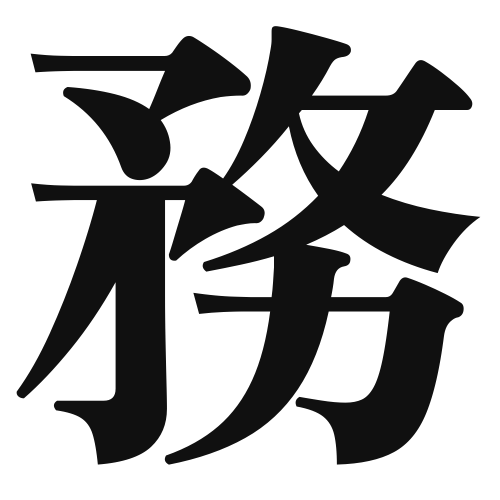1. Overview of Meaning
The kanji 務 (mu) generally means “duty,” “task,” or “work.” It conveys the idea of responsibility and obligation in various contexts.
2. Formation and Radical
Formation of the Kanji: The kanji 務 is a phonetic-ideographic character (形声文字). It combines the radical for “strength” (力) with a phonetic component that suggests its pronunciation.
Radical: The radical of 務 is 力, which means “power” or “strength.” This reflects the effort required to fulfill duties or tasks.
3. Examples of Usage
Common Words and Phrases: Some frequently used words that include 務 are:
- 業務 (ぎょうむ, gyoumu) – business affairs
- 任務 (にんむ, ninmu) – mission or assignment
Example Sentences in Daily Conversation:
- 私の務はこのプロジェクトを成功させることです。
- (My duty is to make this project successful.)
4. Synonyms and Antonyms
Similar Kanji: A similar kanji is 責 (seki), which means “responsibility.” While both kanji relate to duties, 責 emphasizes accountability, whereas 務 focuses on the tasks themselves.
Opposite Kanji: An antonym is 怠 (tai), which means “neglect” or “laziness.” This contrasts with 務, as it implies a lack of effort or responsibility.
5. Cultural and Historical Background
Relation to Japanese Culture: The concept of 務 is deeply embedded in Japanese culture, where fulfilling one’s duties is highly valued. This is reflected in various aspects of life, including work ethics and social responsibilities.
Proverbs and Idioms: One common saying is 義務を果たす (gimu o hatasu), which means “to fulfill one’s duty.” This highlights the importance of responsibility in Japanese society.
